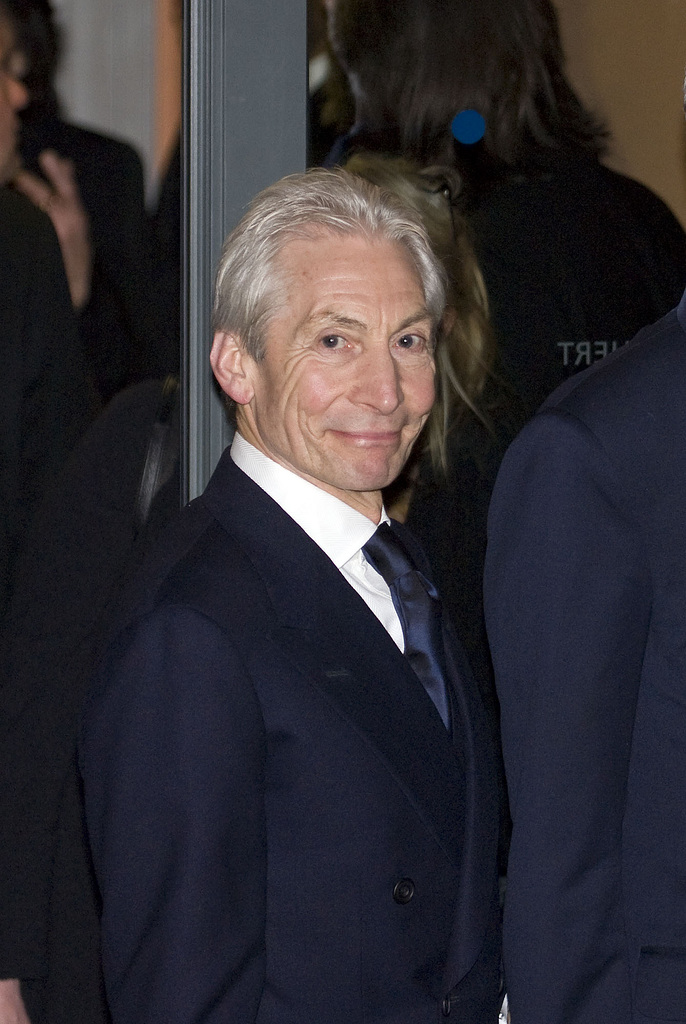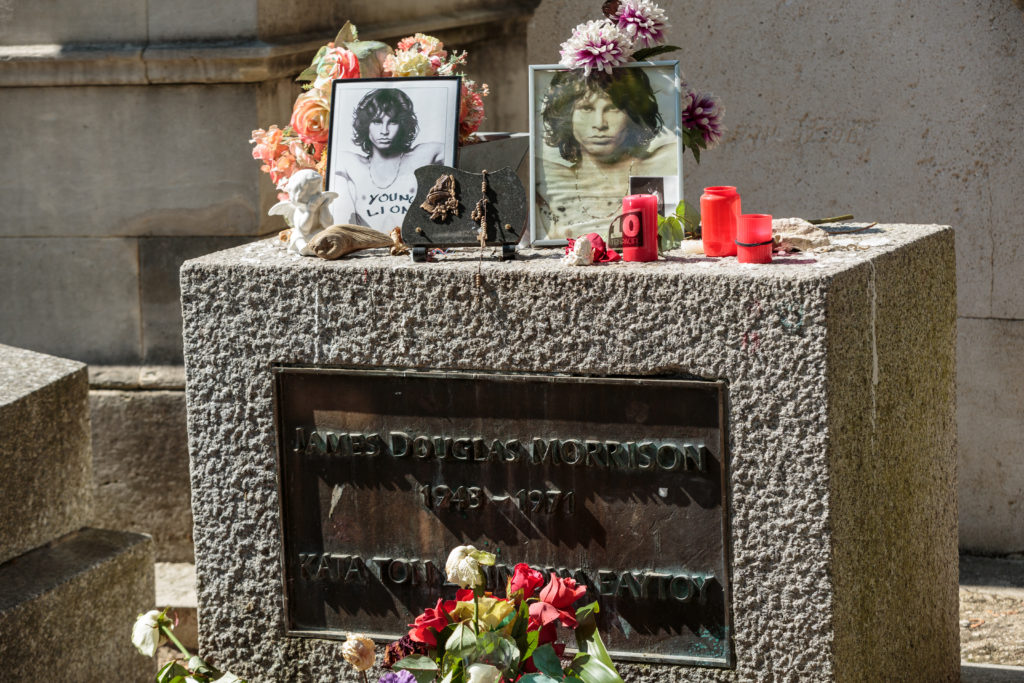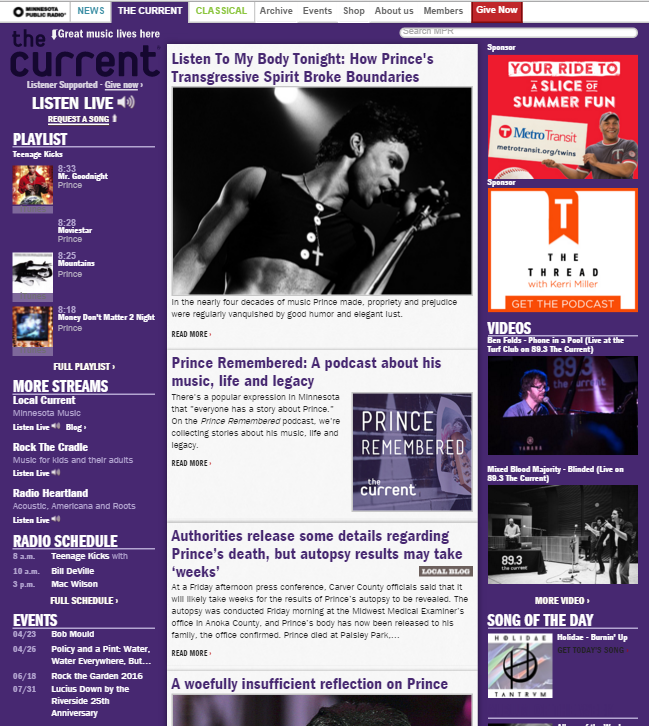
Program Directors are taught to anticipate anything. There are so many things that can happen when you’re running a 24/7/365 operation – like a radio station. If you do it long enough, you will probably experience most of them: weather emergencies, major crimes, community unrest, and maybe even a global pandemic.
For the most part, these events are what we call the “uncontrollables.” You might be able to manage them, but you can’t change them or know exactly when they’ll occur.
But then there are the inevitabilities –you may not know when they will happen, but you can be sure they sadly will happen. And when they do, your audience will be rocked to its core.
I’m talking rock star deaths.
Yes, the loss of a musical icon is a fact of life. But in the music business, we know disaster can strike young performers as it sadly has over the decades. Hence, “The 27 Club,” an organization no one wants to be a part of. Members in good standing are music stars who lost their lives at the ripe young age of just 27 years-old. We’re talking Kurt Cobain, Janis Joplin, Jimi Hendrix, Jim Morrison, Amy Winehouse, and eerily, many others.
But then, there are the others who have entered the pearly gates unexpectedly in recent years…and months: David Bowie, Glenn Frey, Prince, Neil Peart, Aretha Franklin, Tom Petty, Clarence Clemons, and so many others.

Last week, it was Charlie Watts, the Rolling Stones’ dapper drummer. Unlike so many of these events that have suddenly occurred during “inconvenient” hours – over weekends, at night, etc. – the announcement that Watts had succumbed at age 80 came during the noon hour ET this past Tuesday. Perfect, right?
But as usual, I saw the outrage on Twitter and Facebook, aimed at Classic Rock stations that made no announcement about Watts’ death, nor played any Stones songs. Stations that heavily voicetrack and/or use midday talent from out of the market, were especially likely to have missed the moment.
Our staff immediately started checking our client stations – to ensure they were aware of the news, and to confirm they responded with the appropriate response (wall-t0-wall Stones songs, tributes to Watts from other/local rockers, listener phones, etc.). I was pleased with how most of them reacted to the news.
The ironic part about Watts’ passing and the timing of this post is that I originally planned on publishing it on what turned out to be the morning of his death, obviously oblivious to what was to happen. Instead, the debacle surrounding the Jeopardy hosting situation was trending, so I opted instead to go for (what appeared to be) the more timelier story. I reasoned another “what-to-do-when-a-rock-star-dies post” could wait a day.
I had received a Nieman Lab story over the weekend – “How The New York Times assesses, tests, and prepares for the (un)expected news event” – the basis for today’s post. Written by a trio of NYT journalists, it is technical in nature, mostly discussing the newspaper’s ability to handle web traffic during stressful times – elections, the Olympics – as well as these unplanned events that just happen.

Major news departments – especially in broadcast and cable TV, as well as newspapers – have “morgues” – bureaus and resources of famous people who are alive – at least for now. As we know, so many music stars have passed away unexpectedly. Radio stations need the same ability to be resilient the next time those push notifications start pinging our smartphones, tablets, smart watches, and email in-boxes.
More and more broadcast companies are employing web writers, most of whom are penning articles, features, and yes, “click bait” for station and company websites. Having to create a station (or company) morgue for aging rock stars is just smart preparation for the inevitable.
And it would provide programmers and webmasters with the materials they need to begin tribute programming without having to scramble. Better yet, canned interviews, sound bites, song and album archives, as well as the type of features I talked about last week – “The 10 Things You Didn’t Know About Charlie Watts” – should be part of the resources.
Being “in the moment” when these life-shaking, expected/unexpected events take place reflects positively on a station, whether you play rock, country, pop, hip-hop, or alternative. Listeners count on radio to deliver during these times.
As we have learned during the PPM era, a smart, well-programmed tribute can translate to a positive ratings day – or even more. Programmers will tell you that a brand can enjoy a real moment based on its coverage of a deceased star – especially when they have local significance.
or even more. Programmers will tell you that a brand can enjoy a real moment based on its coverage of a deceased star – especially when they have local significance.
That was the case five years ago when The Current in Minneapolis pulled out all the stops when their city’s beloved icon, Prince, suddenly passed away.
As importantly, Pandora, Spotify, YouTube, podcasts, and most satellite radio channels are simply not geared for “breaking news.” They aren’t live. They aren’t agile. And that’s not what consumers “hire” them to do, to get all Clayton Christensen on you.
Radio’s mission is not just to execute formats by playing the hits, keeping talk to a minimum, and running two long stopsets every hour. When something important, relevant, and newsworthy happens that impacts the audience – the tribe – it is a station’s responsibility to lean into these events.
I know of a number of stations that made the announcement after Watts’ death, played a Stones twofer, and went right back to “regularly scheduled programming.”
Radio has to do better, whether a station is in Cleveland, Chattanooga, or Cheyenne. On those big days, many consumers look to radio to reflect their feelings. As we’ve learned the hard way over the years, from the deaths of Elvis, Lennon, Petty, Bowie, and a growing list of others, these are emotionally powerful days.
And we can predict the future. It is going to happen again and again.
We should most definitely be prepared next time to expect the unexpected.
- Media And Technology In 2025: Believe It Or Not! - April 18, 2025
- In Radio, You Just Never Know - April 17, 2025
- The Secret To Making A Great Podcast (And Great Radio) - April 16, 2025




Although the station I program is minimally staffed, I got our Afternoon tracker to recut a bunch of breaks and play Stones songs, as well as re-work our daily Stones Feature, The Stones Set at 6.
But wall to wall Stones was not, in my view, a fit for a Classic HITS station. Classic Rock; sure. But they’re different creatures. We did lots of Stones. And lots of other hits, bot on the day of his death and the next day.
What’s your view on the response for Classic Hits vs Classic Rock?
That’s the way I would’ve played it, too. The Classic Hits audience is more focused on the hits – not necessarily who played bass on “Layla.” Charlie Watts meant a lot to Classic Rockers, but the Classic Hits crowd is nowhere near as artist-oriented. Looks like you showed the even prerecorded stations have agility – when the PD cares.
Cool thanks. The day after I pumped Facebook to generate requests, then played every last one… either in the mix or in the feature.
When radio responds, people connect with the call letters. Even the custom automation allowed for immediate increase of the classic hits Stones play, on the high wire above the dynamite shack at the CT. Goat Yoga Farm. (Talk about unexpected). Thanks, Fred! Here’s to a safe Labor Day Weekend and Recovery for All in The New Season.
Thanks, Clark, and best wishes for a great long holiday weekend yourself.
At 107.1 the Peak our PD and morning guy stayed on live until 7pm and played NOTHING but Stones songs. The listeners loved it.
And per John Covell’s comment, some of them will remember what you did for years.
Moments after the news broke of Charlie Watts passing, WEZX (Rock107) launched digital billboards throughout NEPA and our midday jock immediately came in re voice tracked and we went into a super block of the Rolling Stones.
The Station paid tribute with blocks every hour for the rest of the day with imaging that was produced minutes after the news broke.
Love it, Mark. You guys really can be in the moment with those boards. Makes you wonder how many locals heard the news about Charlie past your board.
Ready response is important, as you note, Fred, but two aspects should be stressed.
1. Talent’s expression of sympathy must be sincere. Listeners will quickly notice if the person behind the mic doesn’t really feel it or doesn’t actually know much about the one who has passed. Don’t try to fake it.
2. The tribute can and ought to go beyond just playing a bucketload of the late performer’s recordings. I’ll never forget when I learned of Jimi Hendrix’s death in 1970 on one of San Francisco’s great freeform stations, and the jock segued from the sad announcement into “El Condor Pasa”–it was amazingly eloquent and impactful. (After all, I still remember it, right?)
Good points, John. These situations need to handled with a good touch. And as you suggest, if you do it right, it can form an indelible memory.
Hi Fred. A couple of things.
Forgive me for tagging along this theme with some self promotion, but to quote Barack Obama when he hit the 3 pointer with cameras rolling when walking through a gym on the Joe Biden campaign trail… “This is what I DO!” …in terms of helping radio respond quickly, with depth and feeling, to the passing of major music stars.
For 20 years now, I have been producing in-depth docs and career retrospectives on living Classic Rock and Americana artists (recently Bruce Springsteen, Carol King, Jackson Browne, Emmy Lou Harris, Steve Cropper, Joni Mitchell, Jerry Lee Lewis, James Taylor and soon shows on Stevie Wonder, Mavis Staples and Smokey Robinson). I’ve also made it my mission to do the quickest turn-arounds possible on 1 and 2 hour specials, on big stars who pass on. Generally, I get them out within 24-48 hours after a passing has occurred. The shows usually include expert commentary from top music writers, to add the necessary context and heft to the tributes. Lately that’s meant full heart-felt, moving tributes to John Prine, the Everly Brothers, Nanci Griffith, Jerry Jeff Walker, and in recent years on Prince, Petty, Bowie, BB King, Gregg Allman, Glenn Frey, Aretha, Little Richard and sadly too many more to list. See and sample the archive of shows on the living and the dead here:
https://exchange.prx.org/pieces/368326
This “service” doesn’t supersede the immediate need for commercial and non-com stations to respond quickly on their own, but honestly, not every station has the rock history chops on staff to make the most appropriate music choices and to say the most relevant things to put the passing star’s importance and contribution into perspective. I’m happy to be a call-out resource to any station that might need some help in getting someone or something on the air quickly to help them handle the moment.
As it is, I try to quickly get word out to my own station e-mail list that an “appointment listening” hour or two is on the way. In that email, I often give stations a featurette preview to run quickly as they promote the upcoming special. So far, it’s public stations that have been most interested in these shows but there’s no reason why your Classic Rock and Classic Hits commercial stations couldn’t benefit from having these special programs available to listeners within a day or two. So, anyone interested in connecting with me on this topic, feel free to email me at [email protected].
When it came to Charlie Watts, I’d happened to have already produced a one and two-hour special on just his story to mark his 80th birthday earlier this year. It became more timely when he pulled out of the 2021 tour a few weeks ago, and, of course, last week, when I updated the language in the special to acknowledge his passing.
https://exchange.prx.org/pieces/368326
On a personal note, this reminds me of when I was on the air in 1990 when Stevie Ray Vaughn died. I was filling in on Bill Louis’ midday show at WNCX in Cleveland and we went after it like a news story. Talking with stations near the helicopter accident, putting their reporters on the air who had been in touch with Vaughn’s management. I know we were first on the air in Cleveland to announce it and begin our tributes. There had been concerns at the time that Eric Clapton, Robert Cray, or Jimmie Vaughn (also in the concert that night with Stevie Ray) might’ve been on the copter that went down but we were careful only to report what was being confirmed. Then, of course, it was Stevie Ray requests, an album side, Vaughn double shots throughout the day and a rebroadcast of a recent King Biscuit concert of his that night.
It’s good to be ready for the “expected” as you say… now that these favorites of ours are in their 70’s and 80’s. If I can help do these stars that have meant so much to us true justice and tribute as they both age, and check out, then well….it’s a job that I personally think is important work to do.
Paul, I am happy you submitted this comment, and detailed looks at the services you provide. For those who don’t know you, Paul is a serious producer and storyteller who has been committed to Classic Rock and its icons for decades.
You may not know the name Keith Green but he comes to mind as far as how all this affects radio listening. Keith Green was a significantly influential icon in Christian music when he died in a plane crash at the age of 28 in 1982 (missing “The 27 Club” by one year). He remains so to this day. A quick glance at his wikipedia page tells of his being the youngest member of ASCAP and appearing on “What’s My Line?” for having signed a 5-year contract with Decca Records–both at age 11. He was poised to be the next “teen idol.” But what I remember most about his death–like it was yesterday–was not just the shock of the news but of sitting in a bank parking lot listening to caller after caller to the local Christian radio station talking about the influence of his life and ministry on them. It was radio you could not turn off. And I didn’t. I’ll also never forget four words the host said trying to comfort listeners and help make sense of it all–four words that I don’t think a week of my life has gone by in the near 40 years since than that I don’t think of: “God never says ‘oops.'”
Indelible memories, David. Thanks for sharing them. These are sad moments in life, but amazing opportunities for great radio.
At WFNX, we put together a Nirvana A-Z way back in the day. We had it on hand and broke it out when Kurt Cobain died. Not exactly the same thing, but you reminded me of it. Great blog as usual Fred!
Perfect tribute. And the fact you remember it tells me lots of Bostonians do, too. Thanks, Laurie.
Wow, have not thought about that in a long time. Their catalog was very small in comparison to many, yet their impact was enormous. You were one of those people who could make something like that shine. You lived the format, and it showed. Kudos for reminding me of something that we did that was worthwhile and lasting.
Thanks Tai!
We have something called “The Legacy Files” at our company. Something I’ve been working on for years (with help from my team) to get down to a fine science when things like this happen. We have a list of core artists, bios about them, audio clips prepared and edited into IDs along with a list of songs to play when the event happens. This helps take the panic and uncertanty out of what to do – a HUGE step to reduce stress. We open the folder of the artist and everything is right there.
As it should be, Troy. And I like the name “Legacy Files” over “Morgue.” Not as macabre. Thanks or the comment.